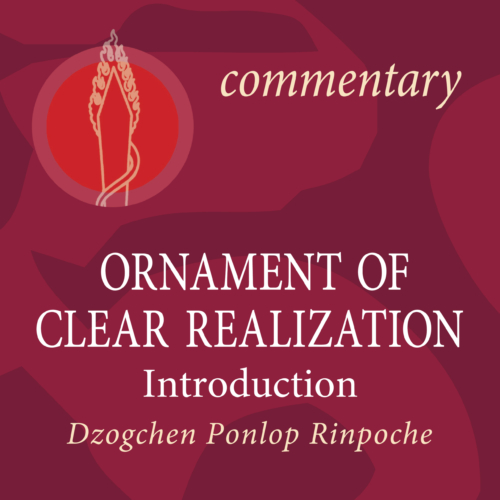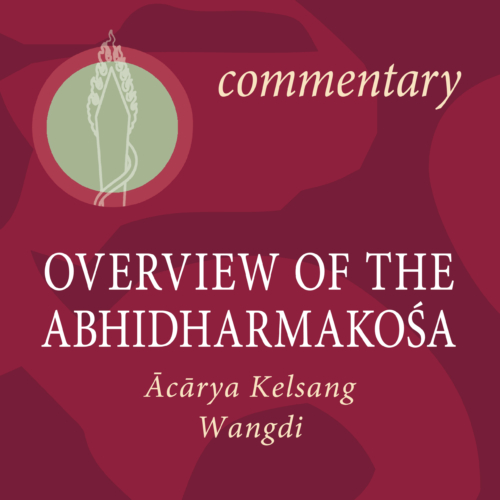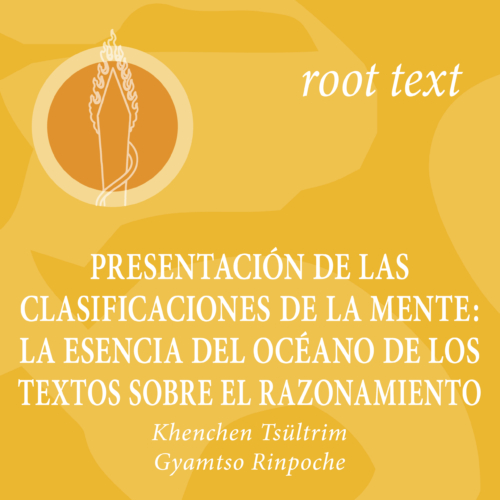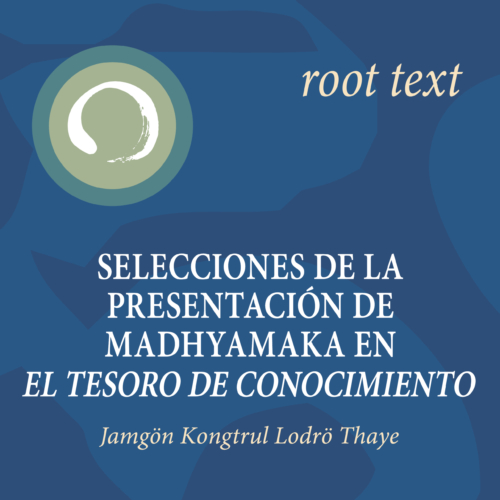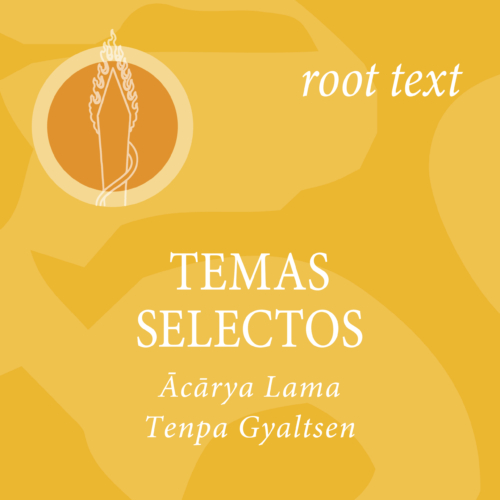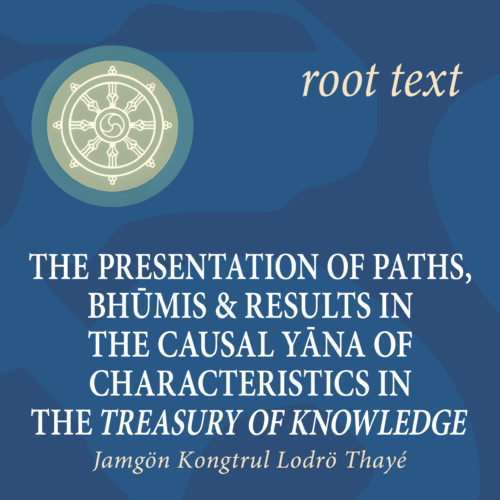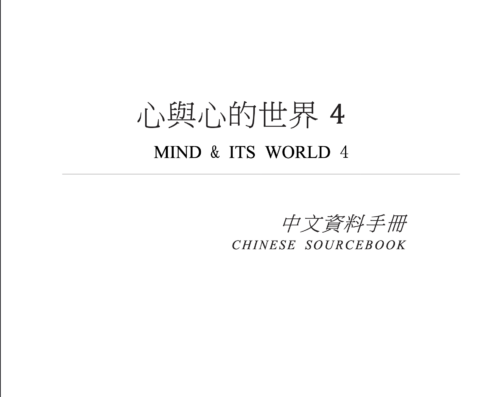-
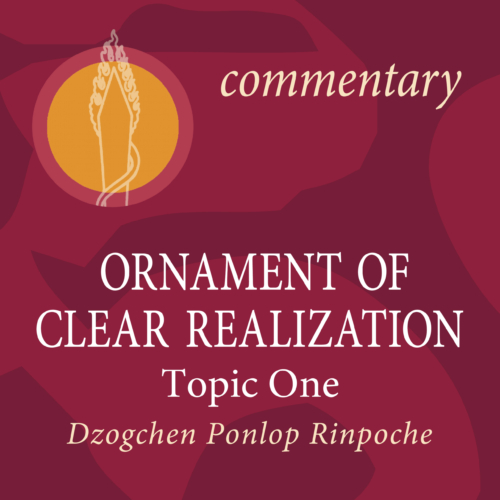
A commentary by Dzogchen Ponlop Rinpoche
This series (Introduction to Topic 8) presents Maitreya’s Ornament of Clear Realization based on the commentary by the eighth Karmapa Mikyö Dorje, Relief of the Noble Ones. Maitreya’s work is the central Mahayana text on the stages of the path and their fruition, for both the Hinayana and Mahayana. It is traditionally summarized in seventy points, or more generally in eight chapters. Whereas the Madhyamaka literature presents the explicit meaning of the Prajnaparamita Sutras, the subject matter of the Abhisamayalamkara is the hidden or implied meaning: the various stages of bodhisattvas, shravakas, and pratyekabuddhas on the path of the meditation on emptiness, from the stage of beginner up through buddhahood. Includes root text by Maitreya and commentary by Mikyö Dorje, translated by Mitra Dr. Karl Brunnhölzl. -
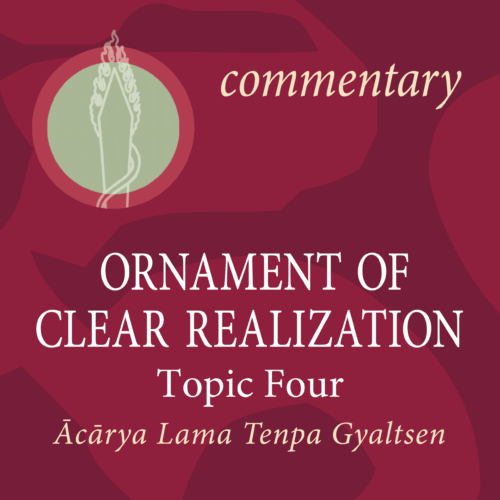
A commentary by Ācārya Lama Tenpa Gyaltsen
This series (Introduction to Topic 8) presents Maitreya’s Ornament of Clear Realization based on the commentary by the eighth Karmapa Mikyö Dorje, Relief of the Noble Ones. Maitreya’s work is the central Mahayana text on the stages of the path and their fruition, for both the Hinayana and Mahayana. It is traditionally summarized in seventy points, or more generally in eight chapters. Whereas the Madhyamaka literature presents the explicit meaning of the Prajnaparamita Sutras, the subject matter of the Abhisamayalamkara is the hidden or implied meaning: the various stages of bodhisattvas, shravakas, and pratyekabuddhas on the path of the meditation on emptiness, from the stage of beginner up through buddhahood. Includes root text by Maitreya and commentary by Mikyö Dorje, translated by Mitra Dr. Karl Brunnhölzl. -
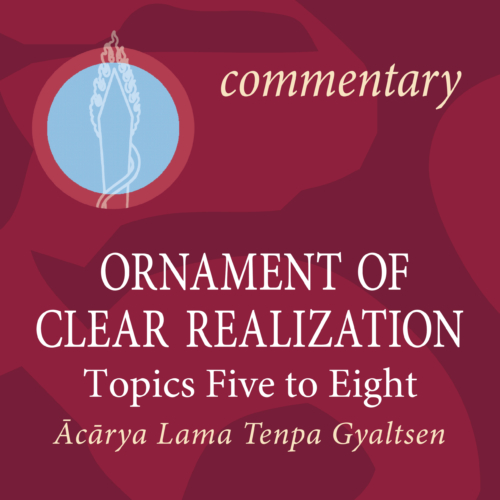
A commentary by Āchārya Lama Tenpa Gyaltsen
This series (Introduction to Topic 8) presents Maitreya’s Ornament of Clear Realization based on the commentary by the eighth Karmapa Mikyö Dorje, Relief of the Noble Ones. Maitreya’s work is the central Mahayana text on the stages of the path and their fruition, for both the Hinayana and Mahayana. It is traditionally summarized in seventy points, or more generally in eight chapters. Whereas the Madhyamaka literature presents the explicit meaning of the Prajnaparamita Sutras, the subject matter of the Abhisamayalamkara is the hidden or implied meaning: the various stages of bodhisattvas, shravakas, and pratyekabuddhas on the path of the meditation on emptiness, from the stage of beginner up through buddhahood. Includes root text by Maitreya and commentary by Mikyö Dorje, translated by Mitra Dr. Karl Brunnhölzl. -
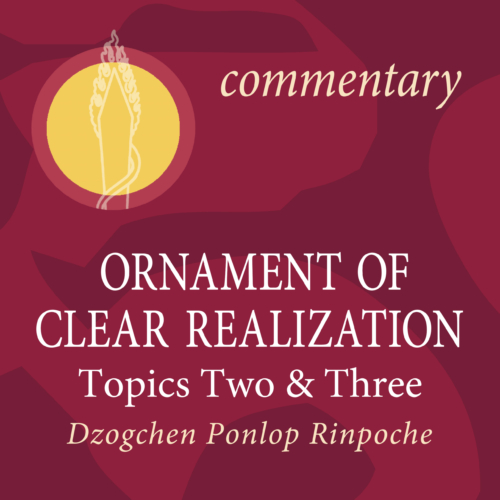
A commentary by Dzogchen Ponlop Rinpoche
This series (Introduction to Topic 8) presents Maitreya’s Ornament of Clear Realization based on the commentary by the eighth Karmapa Mikyö Dorje, Relief of the Noble Ones. Maitreya’s work is the central Mahayana text on the stages of the path and their fruition, for both the Hinayana and Mahayana. It is traditionally summarized in seventy points, or more generally in eight chapters. Whereas the Madhyamaka literature presents the explicit meaning of the Prajnaparamita Sutras, the subject matter of the Abhisamayalamkara is the hidden or implied meaning: the various stages of bodhisattvas, shravakas, and pratyekabuddhas on the path of the meditation on emptiness, from the stage of beginner up through buddhahood. Includes root text by Maitreya and commentary by Mikyö Dorje, translated by Mitra Dr. Karl Brunnhölzl. -
 El libro aún se está actualizando, pero el borrador está disponible para la compra y uso personal. Para comprarlo, los estudiantes DEBEN aceptar los siguientes términos: POLÍTICA DE CURSOS BORRADOR PROVISIONAL Y ACUERDO DE COMPARTIR ARCHIVOS ELECTRÓNICOS:
El libro aún se está actualizando, pero el borrador está disponible para la compra y uso personal. Para comprarlo, los estudiantes DEBEN aceptar los siguientes términos: POLÍTICA DE CURSOS BORRADOR PROVISIONAL Y ACUERDO DE COMPARTIR ARCHIVOS ELECTRÓNICOS:- El costo del Cuaderno de Trabajo de Pensamiento Claro, Borrador Provisional en formato PDF es de USD $21.95 y no es reembolsable. Este monto servirá como pago de depósito para la compra de la versión final publicada del texto. Se le emitirá un código de cupón de descuento para la compra de la versión final, válido por un año después de la publicación del texto final.
- Nota: El cupón no se puede transferir a otra persona, no se puede usar para comprar otros textos y no es válido para ninguna versión de libro electrónico.
- Usted puede usar el Cuaderno de Trabajo de Pensamiento Claro, Borrador Provisional PDF durante la duración de la clase. Sin embargo, una vez que el curso haya concluido, generalmente determinado por la expiración del acceso a las grabaciones de video y audio del curso, DEBE eliminar el archivo PDF de su computadora, así como eliminar el correo electrónico que contiene el archivo PDF adjunto.
- Si prefiere trabajar con una copia impresa de este texto, puede imprimir una copia para su uso personal y también deberá destruirla después de su uso.
- Al final del curso, enviaremos un recordatorio por correo electrónico. En ese momento, se le pedirá que confirme respondiendo al correo electrónico, indicando que el archivo PDF y la copia impresa han sido eliminados. O, también puede informarnos proactivamente que han sido eliminados enviando un correo electrónico a: publications@nitarthainstitute.org
- Si prefiere no comprar la versión final del texto, todavía está obligado a eliminar/destruir el Cuaderno de Trabajo de Pensamiento Claro, Borrador Provisional, y no se emitirá un reembolso por el pago del depósito que realizó para acceder al Cuaderno de Trabajo de Pensamiento Claro, Borrador Provisional.
- Si decide comprar este texto, esto significa plenamente que ha comprendido y acepta esta política.
- Una vez que recibamos su pedido en el sitio web, enviaremos el PDF a la dirección de correo electrónico indicada en el pedido del sitio web. Utilice el mismo correo electrónico que utilizó para registrarse en el curso de Nitartha. Por favor, permita 72 horas para el procesamiento.
- El costo del Cuaderno de Trabajo de Pensamiento Claro, Borrador Provisional en formato PDF es de USD $21.95 y no es reembolsable. Este monto servirá como pago de depósito para la compra de la versión final publicada del texto. Se le emitirá un código de cupón de descuento para la compra de la versión final, válido por un año después de la publicación del texto final.
-
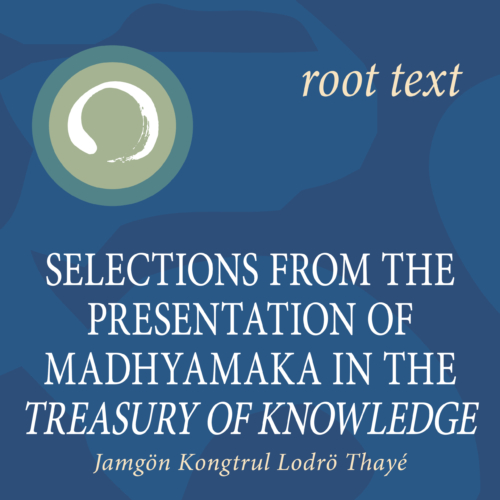
Author: Jamgön Kongtrul Lodrö Thayé Translator: Karl Brunnhölzl
A root text based on sections of Jamgön Kongtrul Lodrö Thaye’s Treasury of Knowledge. It systematically presents the Madhyamaka view of the two truths, the assertions of the subschools of the tradition, and formulates the emptiness reasonings. -
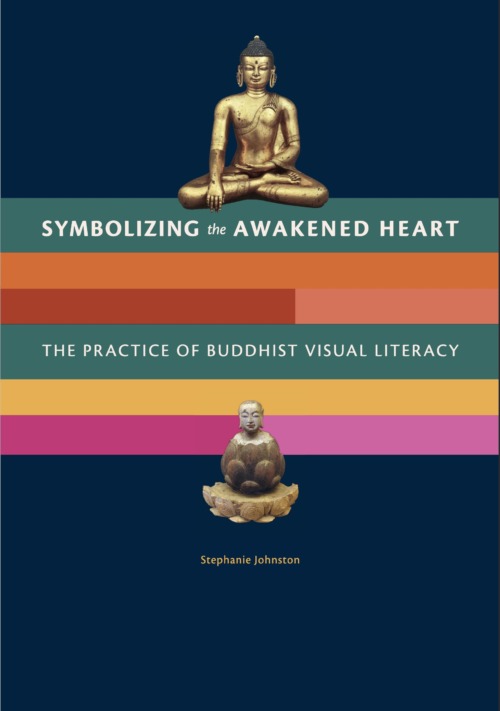
Written by Stephanie Johnston—Nitartha Institute faculty member and designer fascinated by the language of symbols—this book offers a practical introduction to Buddhist visual literacy, showing how symbols in Buddhist art can illuminate the path of enlightenment and awakening. It teaches you how recognizing and working with these symbols becomes a contemplative practice in itself.
Through three main parts, Symbolizing the Awakened Heart guides you from foundational ideas about symbolism to a visual primer for reading Buddhist imagery, and finally to hands‑on exploration with twelve artworks. Along the way, short experiments, questions, and field‑friendly practices invite you to engage directly—at home, in museums, or out in everyday life—so that insight grows from your own experience.
This eBook is delivered as a high‑resolution ePub designed to be viewed in spreads (two pages side by side). For the best experience, use a tablet, laptop, or desktop rather than a phone. The pages are created so that 1 ePub page equals 2 print book pages, and you can zoom in to see image details and then zoom out again. There are no internal links in this ePub, so you may wish to use your reading app’s bookmark feature to mark important sections as you go. -

ROOT TEXT
Madhyamaka is a potent and universally accessible means of calming our suffering and awakening to our innate wisdom. The Center of the Sunlit Sky artfully rescues this brilliant teaching from its unwarranted reputation for intellectual opacity and reinstates it as a supremely practical tool kit for everyday living. The aim of this book is to take Madhyamaka out of the purely intellectual corner into which it unjustly gets boxed. It is an attempt to show how Madhayamaka actually addresses and works with all of our experiences in life. The book follows the original Indian sources as well as the standard commentaries on Madhyamaka in the Kagyu School of Tibetan Buddhism. At the same time, these materials are adapted for a contemporary audience, combining the familiar sharpness of Madhyamaka reasonings (launching a massive assault on our cherished belief systems) with exploring the practical relevance of the Madhyamaka way of mind training. Also available as an eBook for Kindle devices. Note that the hardcopy book is shipped from the US. International customers may wish to explore local booksellers or Amazon.com to save on shipping cost. -
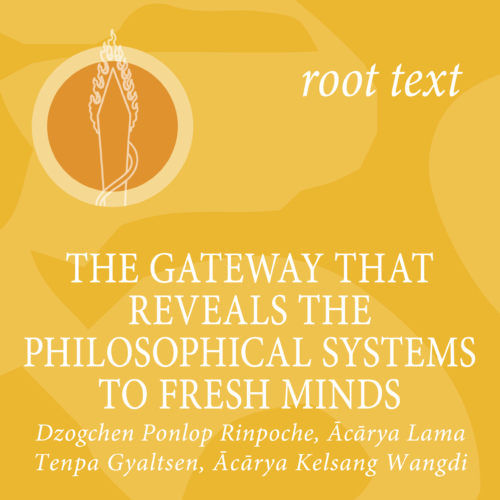 Updated Edition. Ebook available: for Apple and Google.
Updated Edition. Ebook available: for Apple and Google.Author: Dzogchen Ponlop Rinpoche, Acharya Lama Tenpa Gyaltsen, and Acharya Kelsang Wangdi Translator: Karl Brunnhölzl
A root text written by Dzogchen Ponlop Rinpoche, Acharya Lama Tenpa Gyaltsen, and Acharya Kelsang Wangdi. It presents the divisions and definitions of the Vaibhashika and Sautrantika philosophical systems.
-
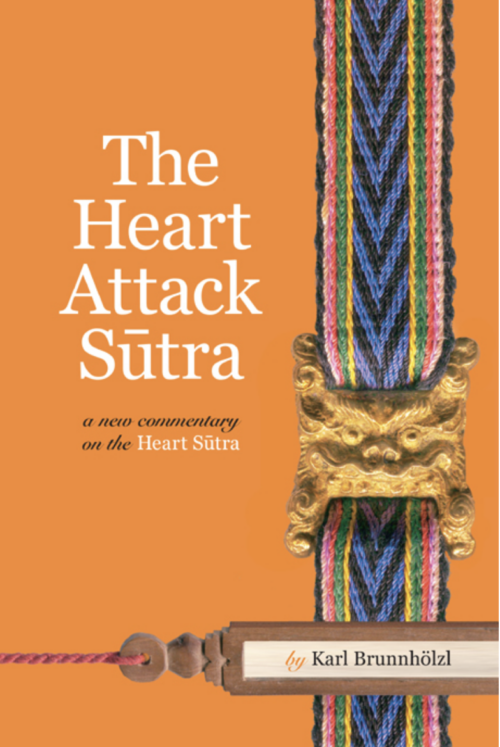
- The hardcopy book is shipped from the US. International customers may wish to explore local booksellers, Shambala Publications, or Amazon to save on shipping cost.
Author: Mitra Dr. Karl Brunnhölzl
A guide to the famous Heart Sūtra that reveals the tenderness and compassion underlying the striking rhetoric of this popular Buddhist text The radical message of the Heart Sūtra, one of Buddhism’s most famous texts, is a sweeping attack on everything we hold most dear: our troubles, the world as we know it, even the teachings of the Buddha himself. Several of the Buddha’s followers are said to have suffered heart attacks and died when they first heard its assertion of the basic groundlessness of our existence—hence the title of this book. Overcoming fear, the Buddha teaches, is not to be accomplished by shutting down or building walls around oneself, but instead by opening up to understand the illusory nature of everything we fear—including ourselves. In this book of teachings, Karl Brunnhölzl guides practitioners through this ‘crazy’ sutra to the wisdom and compassion that lie at its core. Karl Brunnhölzl, MD, was trained as a physician and also studied Tibetology. He received his systematic training in Tibetan language and Buddhist philosophy and practice at the Marpa Institute for Translators, founded by Khenpo Tsultrim Gyamtso Rinpoche. Since 1989 he has been a translator and interpreter from Tibetan and English. He is presently involved with the Nitartha Institute as a teacher and translator. -
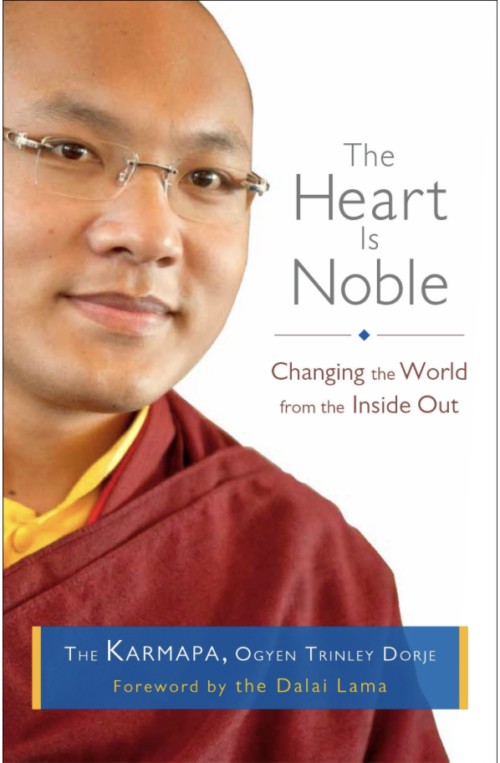
- The hardcopy book is shipped from the US. International customers may wish to explore local booksellers, Shambala Publications, or Amazon to save on shipping cost.
Author: Karmapa Ogyen Trinley Dorje
If you are inspired to take up his challenge, the Karmapa offers a path for participating in a global community that is based on compassion. In these chapters, he shares his vision for bringing social action into daily life, on a scale we can realistically manage through the choices we make every day—what to buy, what to eat, and how to relate honestly and bravely with our friends and family and coworkers. His fresh and encouraging perspective shows us that we have the strength to live with kindness in the midst of the many challenges we face as socially and environmentally conscious beings. Because he sees the world through the lens of the interdependence of all beings, he sees that humans can change social and environmental problems by changing their attitudes and actions. And so, he shows ways that we can change our world by changing ourselves—by examining our own habits of consumption and by being willing to look into how our food reaches our table and how the products we buy are made. In his chapter on gender, he points out that we don’t have to label others according to a social construct.
If his viewpoint seems optimistic, it is—and it’s also demanding. The Karmapa calls on us to open our mind and heart to the innumerable connections we share with others—in our families, communities, social systems, and on our planet. Thanks to the depth of his spiritual training, and the breadth of his curiosity about the world and his love for it, he presents a relevant framework for understanding what it means to be human now—and why it’s imperative that we concern ourselves with the well-being of all others. He points to a world we can create through our own effort, using a resource we already have in abundance—the basic nobility of our human heart. The 17th Gyalwang Karmapa, Ogyen Trinley Dorje, is the spiritual head of one of the major schools of Tibetan Buddhism. The 900-year-old lineage of Karmapas has included some of Tibet’s greatest spiritual masters. Born to nomadic parents in rural Tibet, he was identified while still a young child as the heir to this leadership position. In 2000, the Karmapa’s dramatic escape to India from Chinese-ruled Tibet at the age of fourteen propelled him onto the world stage. Since then, he has emerged as an international Buddhist leader and environmental activist, founding Khoryug, a region-wide environmental protection program. The Karmapa has been dubbed the "new face of Tibetan Buddhism," and many Tibetans look to the Karmapa for inspiration in their struggle to preserve their embattled culture. In 2008, he made his historic first visit to America. -
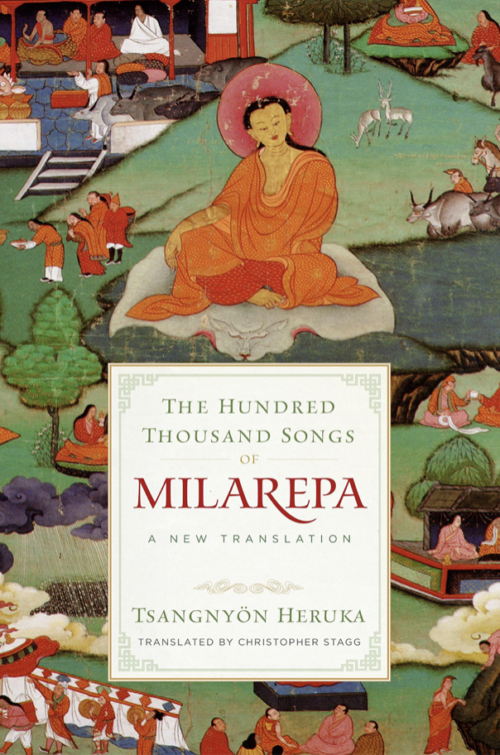
- The hardcopy book is shipped from the US. International customers may wish to explore local booksellers, Shambala Publications, or Amazon to save on shipping cost.
Authors: Tsangnyön Heruka and Milarepa Translator: Christopher Stagg
Christopher Stagg served as a translator and interpreter for the Nitartha Institute and Nalandabodhi, both under the direction of Dzogchen Ponlop Rinpoche. Also trained as a public school music teacher. -
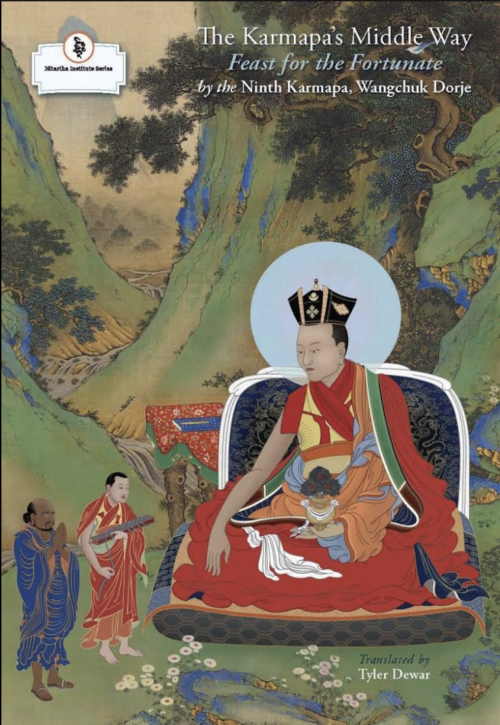
- The hardcopy book is shipped from the US. International customers may wish to explore local booksellers, Shambala Publications, or Amazon to save on shipping cost, or purchase the Kindle edition.
Author: Wangchuk Dorje Translator: Tyler Dewar
Marked by eloquent poetry, vigorous and extensive analysis and heart instructions on breaking through the veils of confusion to independently experience the true nature of things, The Karmapa's Middle Way contains the Ninth Karmapa Wangchuk Dorje's comprehensive commentary on the Indian master Chandrakirti's seminal text, the Madhyamakavatara or Entrance to the Middle Way. This commentary, Feast for the Fortunate, is the Ninth Karmapa's abridgement of the Eighth Karmapa Mikyo Dorje's masterpiece, the Chariot of the Takpo Kagyu Siddhas. In it, readers will find previously unavailable material on the Karmapa's Middle Way view and a rare window into a philosophically charged era of Middle Way exposition in Tibetan Buddhism. Chandrakirti and the Karmapa present in precise detail the vital Buddhist concept of emptiness through which the Mahayana path of compassionate altruism becomes complete. Introductory material, copious footnotes, appendices, and a reader-centric approach to the language will make this volume equally accessible to the seasoned scholar of Indo-Tibetan Buddhism and the newly curious nonspecialist alike. -
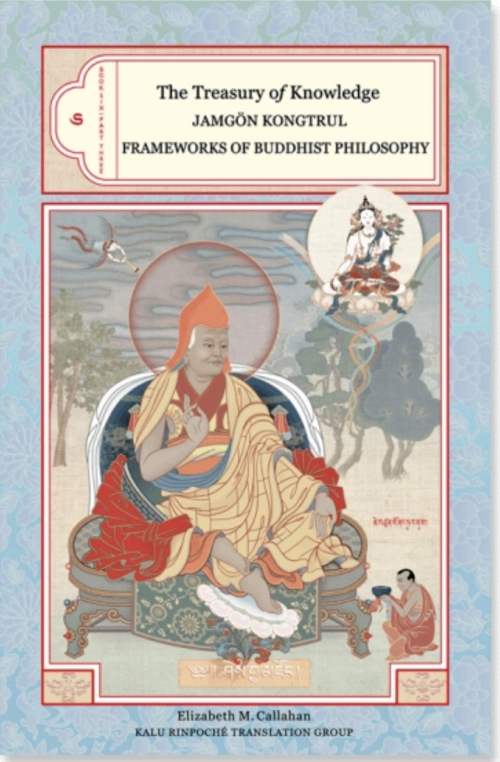
- The hardcopy book is shipped from the US. International customers may wish to explore local booksellers, Shambala Publications, or Amazon to save on shipping cost.
Author: Jamgön Kongtrul Lodrö Thayé Translator: Elizabeth M. Callahan
In Tibetan religious literature, Jamgön Kongtrül's Treasury of Knowledge in ten books stands out as a unique, encyclopedic masterpiece embodying the entire range of Buddhist teachings as it was preserved in Tibet. This volume, Frameworks of Buddhist Philosophy, is his masterful survey of the broad themes and subtle philosophical points found in more than fifteen hundred years of Buddhist philosophical writings. In a clear and systematic manner, he sets out the traditional framework of Buddhism's three vehicles and four philosophical systems, and provides an overview of the key points of each system. His syncretic approach, which emphasizes the strengths of each of the systems and incorporates them into a comprehensive picture of philosophical endeavor, is well-suited for scholar-practitioners who seek awakening through the combination of analytical inquiry and meditation. -
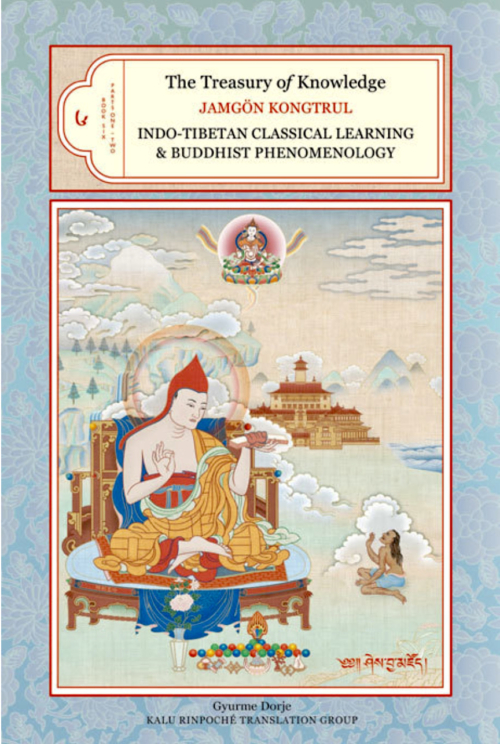
- Also available as an eBook for Apple and Android devices.
- The hardcopy book is shipped from the US. International customers may wish to explore local booksellers, Shambala Publications, or Amazon to save on shipping cost.
Author: Jamgön Kongtrul Lodrö Thayé Translator & Editor: Gyurme Dorje
Jamgön Kongtrul’s encyclopedic Treasury of Knowledge presents a complete account of the major lines of thought and practice that comprise Tibetan Buddhism. Among the ten books that make up this tour de force, Book Six is by far the longest—concisely summarizing the theoretical fields of knowledge to be studied prior to the cultivation of reflection and discriminative awareness. The first two parts of Book Six, contained in this volume, respectively concern Indo-Tibetan classical learning and Buddhist phenomenology. The former analyzes the traditional subjects of phonology and Sanskrit grammar, logic, fine art, and medicine, along with astrology, poetics, prosody, synonymics, and dramaturgy. The principal non-Buddhist philosophical systems of ancient India are then summarized and contrasted with the hierarchical meditative concentrations and formless absorptions through which the "summit of cyclic existence" can genuinely be attained. Part Two examines the phenomenological structures of Abhidharma—the shared inheritance of all Buddhist traditions—from three distinct perspectives, corresponding to the three successive turnings of the doctrinal wheel. -
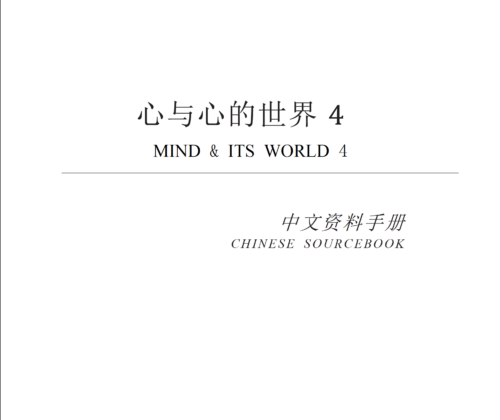
中国大陆的学生请在此处订购电子版: 电子版
该手册作为由竹庆本乐仁波切指导下的了义学院课程资料而出版。
《心与心的世界 4》中文资料手册,2026年1月初稿 © 2026 了义学院 版权所有。未经书面许可,不得以任何方式改编或复制本书的任何部分。以下为原英文版权页。 Mind & Its World 4 Sourcebook © 2024 Nītārtha Institute
